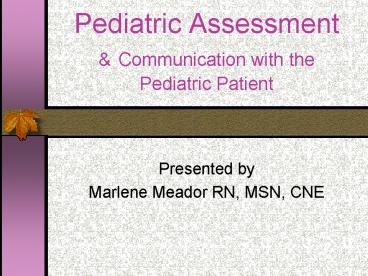Pediatric Assessment - PowerPoint PPT Presentation
1 / 22
Title: Pediatric Assessment
1
Pediatric Assessment Communication with the
Pediatric Patient
- Presented by
- Marlene Meador RN, MSN, CNE
2
Considerations and strategies for cooperation
- Remember developmental age (why is this crucial
to success?) p 802 table 32.3 - Honesty
- Involve child- speak directly to the child
- Involve parents when appropriate
3
Barriers to Communication
- Language
- Cultural differences
- Distraction
- Stress/conflict
4
Quick Question?
- What is the best way to ruin the relationship
between the nurse and child client?
5
More questions?
- What is the best nursing rationale for a nurse
allowing the parent to administer medications to
the hospitalized child? - Can you name another reason?
6
Adapting the physical assessment to children
- Physical proximity to the child/patient
- Physical contact
- Sequence of assessment
7
Why is an accurate history the single most
important component of the physical examination?
- Substantive data
- Objective data
8
Three types of health history
- Complete or initial
- Conception to current status
- Well or interim
- Previous well visit to current visit
- Problem-oriented or episodic
- Information related to current problem
9
Two types of assessment
- Primary- ABCDEs
- Airway, breathing, circulation, LOC (disability,
exposure) - Secondary
- VS, pain, history and head-to-toe assessment and
inspection - Height/weight, diagnostic testing
10
Adaptations in Emergency Assessment
- S- signs and symptoms
- A-allergies
- M-medications and immunizations (OTC and herbal)
- P- prior illness or injury
- L- last meal and eating habits
- E- events surrounding illness/injury
11
Obtaining a history
- Open-ended questioning
- Re-phrase rather than repeat
- Listen actively (reflective reply)
- Cultural differences
- Avoid judgmental questions
- Give an example of each type of question with a
more therapeutic version.
12
Priority Assessment!
- What are the areas of priority assessment?
13
Priority Assessment!
- Airway-
- Breathing-
- Circulation-
- VS-
14
Obtaining a Health History
- Presenting illness/injury
- Onset of symptoms
- Type of symptoms
- Location
- Duration
- Severity
- Aggravating factors
- Lab findings
- Previous or current illness
15
Obtaining a Health History
- Birth History
- Prenatal care (onset and duration)
- Mothers age and health at time of birth
- Mothers history of illness, injuries
- Mothers impression of pregnancy (also
significant others impression)
16
Obtaining a Health History
- Familial or Inherited Disorders
- Chromosomal disorders in other family members
- Height and weight
- Diabetes
- Cardiovascular disease
- Asthma/ reactive airway disease
- Allergies
17
Assessment Findings head to toe (page 817-847)
- Head (eyes, ears, hair, shape, FOC)
- Chest- cardiac, respiratory, excursion- shape
- Abdomen- size, shape, tone
- Musculoskeletal- posture, tone, symmetry
- Neuro- reflexes
- Skin- including hair
- Genitalia- age appropriate
18
Quick Review
- Why is it important for the nurse to know the
normal range of vital signs specific to the age
of patients? - Table 33-1
19
How does the nurse prioritize assessment findings?
- Stay alert to what would cause harm
- Is this an acute need? Or at risk for?
- How does the nurse select the intervention?
- How do you evaluate the effectiveness of the
intervention?
20
What physical and psychosocial findings suggest
abuse or neglect?
- Dress
- Grooming and personal hygiene
- Posture and movements
- Body image
- Speech and communication
- Facial characteristics and expressions
- Psychological state
21
When would the nurse notify CPS?
- What are the nurses legal obligations
- What are the nurses ethical obligations?
22
- Please contact Marlene Meador RN, MSN if you have
any questions or concerns regarding this
information. - Mmeador_at_austincc.edu
- 512-422-8749

